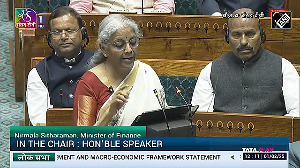Bhima Koregaon represents what the government can do in India against well meaning people who speak up against atrocities, who stand up for the weak and the dispossessed and for this reason alone as seen as enemies of the State and kept in prison for as long as the government can manage, asserts Aakar Patel.

This month marks five years since the first arrests in the Bhima Koregaon case.
A total of 16 people were arrested in the case, including one, Father Stan Swamy, who died in custody.
Most of them remain in jail. None has been convicted in the case, none has been connected with violence in the place for which the matter is named.
If there is a case that exemplifies the draconian nature of the law they have been arrested under, the cruelty of the State intent not on prosecuting cases but keeping people jailed indefinitely, it is this one.
It is important that we not forget it or those jailed under it. Less than 10% of all cases under UAPA have ended and only a fourth of all cases adjudicated end in convictions.
In this particular case, this set of activists, which includes academics, professors, lawyers, poets and activists, have been accused of waging war against the State.
The man who filed the complaint on the basis of which the arrests were made says he follows a 'simple' rule for his Hindutva: 'We should keep things which are helpful for Hindus; rest should be abandoned.'
After his complaint, the case would be spun to include accusations of attempting to overthrow the government and assassinate the prime minister.
When the BJP was defeated in the Maharashtra elections, the case was taken away from the Pune Police.
Uddhav Thackeray was sworn in on November 28, 2019. The Union government told Maharashtra that it had given the case to the NIA on January 24, 2020.
One can infer from that what one wants, but all of this has been accompanied by mistreatment of the accused by the government.
The media firm NewsLaundry made a list of some of these things.
Stan Swamy, suffering from Parkinson's disease, was disallowed a glass with a sipper straw in jail for weeks.
Shoma Sen, suffering from arthritis, found it difficult to use the Indian commode in jail.
Her daughter brought her a commode chair, but was turned away.
Surendra Gadling asked to access books including the UAPA and IT Acts, some paper to take notes on and four books by Swami Vivekananda.
The government opposed this vehemently, with the prosecutor even saying she was unsure whether Vivekananda's books were banned or not in India.
After the court allowed the books to be brought, prison authorities still did not allow them to be given to Gadling.
He was disallowed a sweater despite a court order, being told that only thermal sweaters were allowed and not woollen ones.
When his wife brought him a full-sleeved thermal sweater, this was disallowed saying that only half-sleeved ones were allowed.
Seventy-year-old Gautam Navlakha's spectacles were stolen in prison. He was virtually blind without his glasses.
But he was not permitted to make a call to ask for a replacement for three days.
His partner sent a pair to the jail, but the jail authorities refused to accept it though they had been informed that the packet was coming.
When Gadling's mother died, he applied to be allowed to attend the funeral.
It was denied on the grounds that his application didn't have her death certificate without which the NIA would not accept that she was dead.
The family could not get the certificate because of the lockdown.
When the certificate was produced, the NIA said the funeral had already been conducted so they saw no reason to let him out temporarily.
When Gadling applied to go to the condolence meeting, this was turned down because he hadn't submitted a 'copy of the meeting' with his application.
When Sudhir Dhawale's brother died, the application was supported with documentary evidence, an announcement card for the post-funeral meeting and the death certificate.
This application was rejected only on the grounds that bail could not be given because the offence was 'serious'.
Mahesh Raut's sister married while he was in jail as an undertrial.
When Vernon Gonsalves's mother died in May 2021, he chose not to put his family through the rigmarole of attempting to get him bail.
In February 2021, The Washington Post reported that the letters 'found' by the police on Rona Wilson's laptop had been planted.
Malware had been used to introduce them to the computer, an independent analysis had found.
These letters, including the one allegedly on the Modi assassination, had been created using a newer version of Microsoft Word that did not exist on Wilson's computer, the report said.
There was no evidence that the documents or the hidden folder were ever opened.
In April 2021, a leading firm in digital forensics said it had 'irrefutable' proof that Wilson's computer was hacked.
Files were planted on it on January 11, 2018, 11 days after the Bhima-Koregaon violence.
Despite all this, most of the accused remain in jail. The Bhima Koregaon case is not the only instance of the government misusing the law to go after those who dissent.
Umar Khalid has spent over 1,000 days in jail for being one of the most eloquent voices against what the BJP is doing to India.
Of course minorities, the poor and the marginalised face the brunt of the brutal State and always have. This is not in dispute.
But Bhima Koregaon is emblematic. It represents what the government can do in India against well meaning people who speak up against atrocities, who stand up for the weak and the dispossessed and for this reason alone as seen as enemies of the state and kept in prison for as long as the government can manage.
So long as the rest of us do not speak up against this misbehaviour by the State, so long as we forget about those who have been made its victims, this behaviour will continue.
The Bhima Koregaon 16 must not be forgotten.
Aakar Patel is a columnist and writer and you can read Aakar's earlier columns here.
Feature Presentation: Aslam Hunani/Rediff.com











 © 2025
© 2025